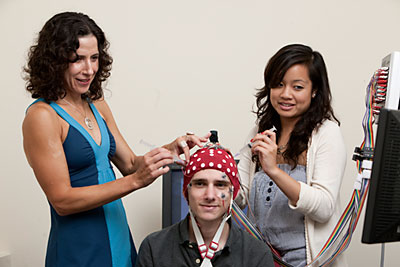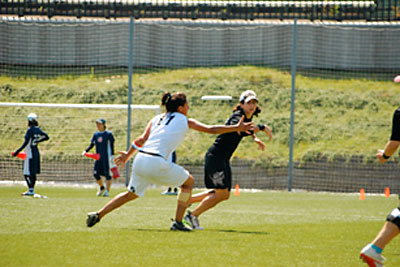Vivian Zayas: 'Attached' to attachment psychology and Ultimate competitions
By Susan S. Lang Caitlin Parker


You could say that attachment is a major theme in the life of Vivian Zayas '94, assistant professor of psychology. She is attached to Cornell -- having been an undergrad here and now a member of the faculty; to Ultimate (Frisbee) -- traveling far and wide on weekends to compete; and professionally attached to attachment, as it's a focus of her research.
As director of the Personality, Attachment and Control Lab, Zayas studies the processes that regulate behaviors within close relationships and how these processes may affect the quality of relationships and mental health. She examines both the emotional and automatic aspects of intimate relationships as well the cognitive and controlled ones.
"What's available to our consciousness is a fraction of what happens psychologically," Zayas says. "We use a number of techniques to try to get at how people respond emotionally and cognitively to socially relevant, personally significant events." To do so, she draws on theories and methods from social and personality, cognitive and developmental psychology, and, most recently, cognitive neuroscience.
Her studies explore how close relationships are mentally represented and how those representations in adulthood are shaped by early relationships. She also looks at how people's futures are shaped by friends and partners with whom they form relationships.
For example, one recent project examined how rejection in a close relationship affects psychological and neural processes. Wearing electrophysiological caps to monitor brain activity, women listened to statements about their relationships. They were told that when they needed support or help -- in both personal ("attachment-relevant") and mundane (nonattachment) situations, their partners would be either supportive ("warm," "comforting") or rejecting ("cold," "distant").
When presented with attachment-relevant situations, the women showed more neural activity when they heard the rejecting cues. This heightened neural activity was not observed in the nonattachment situations, "indicating that the neural activity wasn't simply caused by negative words. Rather, it was specific to rejection," says Zayas.
The findings support the idea that people tend to automatically and quickly allocate more attentional and processing resources to interpersonal threats, Zayas says. However, the neural responses to rejection varied depending on the women's attachment style: Women who tended to worry about their relationship and tended to turn to their partners for support showed the strongest neural responses to rejection.
"What is most remarkable is within a quarter of a second, some women showed really pronounced responses to rejection, and others did not, indicating that the degree of brain response depends on one's sensitivity to partner rejection," Zayas says.
The women who tended not to rely as much on their partners for support "didn't show a strong response to hearing the rejection cues," she says.
Although she majored in psychology at Cornell, Zayas didn't focus on attachment until she was working as a paralegal in the San Francisco Bay area after graduation and decided one day to volunteer in an attachment lab at the University of California-Berkley; her life hasn't been the same since.
She eventually earned a Ph.D. (2003) in psychology at the University of Washington, Seattle, and after working as a postdoctoral fellow on a UW-Columbia National Institutes of Health-funded collaboration, Zayas found herself returning to a familiar place of steep hills and gray days in 2007.
"I had very positive memories and experiences as an undergraduate here, and coming back felt really good," Zayas says.
It also has allowed her to join one of the most elite women's teams in Ultimate, a sport she's been playing passionately since her sophomore year at Cornell. For four years, she's been a member of Boston's Brute Squad, which ranked second in club nationals in 2009 and this past July came in fourth at the World Flying Disc Federation Championships in Prague.
"[Ultimate] pushes me everyday, physically and mentally, and it challenges my beliefs about what I can and can't do," says Zayas. "It's an amazing experience to do something that you didn't think was possible, and it's even more amazing when your team, as a group, breaks those barriers."
Her current attachment: Preparing for the club championships Oct. 28-31 in Sarasota, Fla., where some 12,000 athletes on 650 teams will converge.
Caitlin Parker '13 is a writer intern at the Cornell Chronicle.
Media Contact
Get Cornell news delivered right to your inbox.
Subscribe